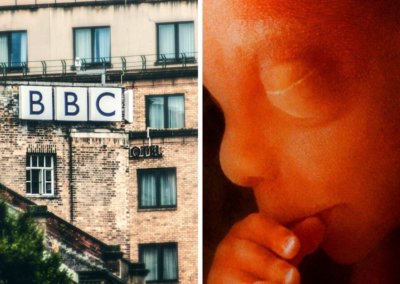A prominent journalist has revealed some of the tactics used by abortion activists and lobbyists in their attempts to control the media and obfuscate the reality of abortion.
Writing for the Sunday Times, John Burns warned those working in the media to be wary of lobby groups proffering ‘reporting guidelines’ that seek to police language and omit details promoting a particular viewpoint.
His warning comes after Ireland’s Abortion Rights Campaign (ARC) sent journalists ‘reporting guidelines’ instructing them to use words and report on details favourable to abortion campaigners, but omit others that could highlight the humanity of an unborn baby.
The ARC ‘guidelines’ state online news websites and newspapers should “refrain from showing images of big bellies of late pregnancy which imply that the foetus is a fully formed baby”.
The group proceeded to warn against the use of “images that make a foetus or embryo look like a fully formed baby”, claiming that images that show an unborn baby are “used by anti-abortion groups in the hopes of creating guilt”.
The imagery ARC proposes should be used instead of the baby bump, is “elected officials working to advance abortion policy”.
The Times’ John Burns says: “Like what? Health minister Simon Harris frowning with concentration, or wringing his hands?”, labelling the other proposals for imagery as “somewhat absurd”.
ARC suggests pro-abortion visuals such as the annual March for Choice; a person speaking with a doctor; or “people working together in a community to raise awareness or increase understanding of the need for abortion services”.
It’s not only imagery that ARC wants to control, but language too.
Journalists should say “pregnant woman or person” instead of “mother” or “parent” – the latter two examples highlight the humanity of an unborn baby, its guidelines state.
The lobbyists say the term ‘unborn baby’ is a recent invention which is “a contradiction in terms” that provides readers with images that are inaccurate, and to use the words “embryo” or “foetus” instead.
The guide also instructs journalists not to use the phrase “abort disabled children” when describing a baby with a disability such as Down’s syndrome being aborted. Instead the term “abortion on grounds of serious fetal anomaly” should be used.
Abortion is not “illegal”; but “legally restricted”. Conversely, when abortion providers and groups like ARC use this language it is because they want to see abortion fully removed from criminal law and see abortions allowed, for any reason, up to birth.
They add that instead of “prevent pregnancies” journalists should say “prevent unintended or unwanted pregnancies” as “abortion should not be seen as a problem but as a possible solution when someone experiences unintended or unwanted pregnancy.”
The term “safe-access zones” should be used over “exclusion zones” so pregnant women can “access health care in private and without being subjected to harassment or intimidation”. However, a pro-life demonstration outside an abortion clinic in Ealing has seen more than 500 women accept an offer of help and chose to keep their baby rather than have an abortion. Some of their stories are documented on the Be Here for Me website.
Sadly, Mr Burns did note that “the most insistent lobbyists tend to get their way”.
This may be the case at the BBC, where for a number of years, their ‘News Style Guide’ has required their journalists to “avoid pro-abortion, and use pro-choice instead”. When it comes to describing the pro-life position they advise journalists to “use anti-abortion rather than pro-life”.
The BBC has also been caught suppressing polling they commissioned for a documentary, called Abortion on Trial, which showed that there was no widespread support to expand the provision of abortion in the UK.
Last year, the Guardian followed the BBC’s lead and adopted changes in how they report on abortion.
Bias from some media outlets against the pro-life position was one of the reasons why Right To Life UK launched a digital news service. The Right to Life UK news service ensures there is a platform where reliable pro-life news and views are accessible to everyone around the world and works alongside their current activities across the media, politics and grassroots.









